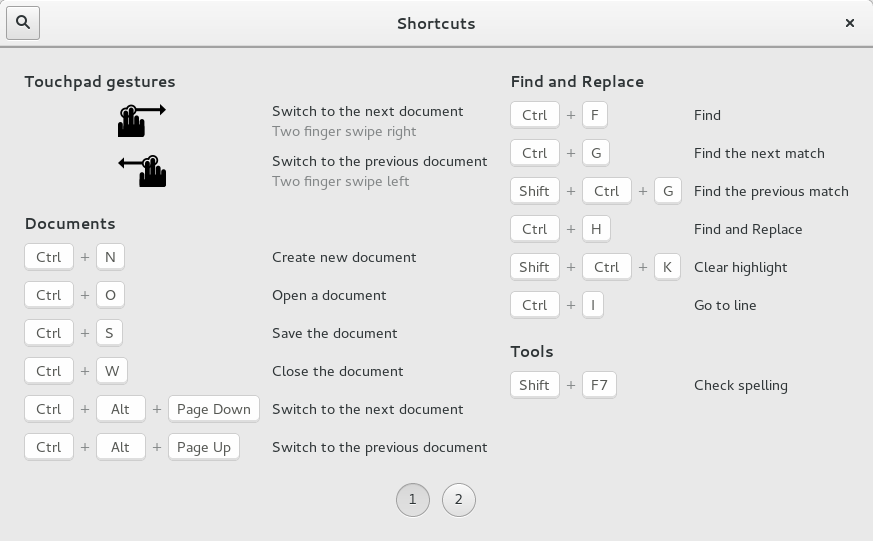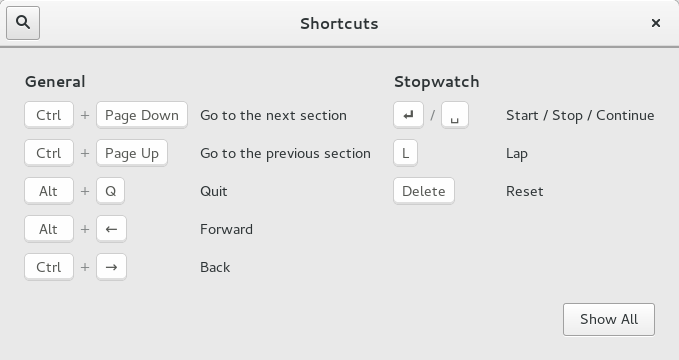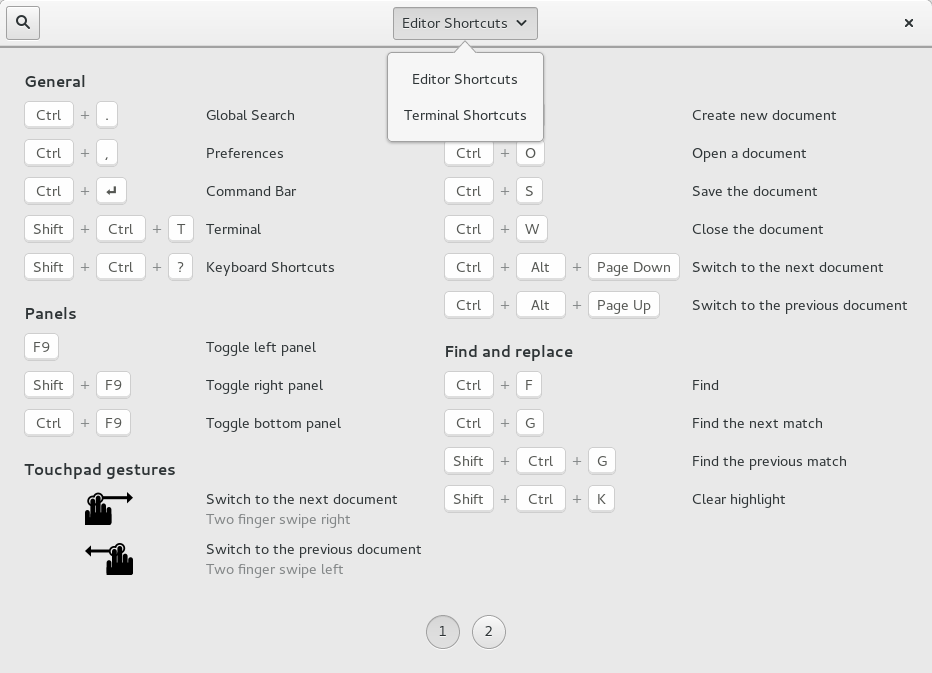Class
GtkShortcutsWindow
deprecated: 4.18
Description [src]
final class Gtk.ShortcutsWindow : Gtk.Window
implements Gtk.Accessible, Gtk.Buildable, Gtk.ConstraintTarget, Gtk.Native, Gtk.Root, Gtk.ShortcutManager {
/* No available fields */
}A GtkShortcutsWindow shows information about the keyboard shortcuts
and gestures of an application.
The shortcuts can be grouped, and you can have multiple sections in this window, corresponding to the major modes of your application.
Additionally, the shortcuts can be filtered by the current view, to avoid showing information that is not relevant in the current application context.
The recommended way to construct a GtkShortcutsWindow is with
GtkBuilder, by using the <child> tag to populate a
GtkShortcutsWindow with one or more GtkShortcutsSection objects,
which contain one or more GtkShortcutsGroup instances, which, in turn,
contain GtkShortcutsShortcut instances.
If you need to add a section programmatically, use gtk_shortcuts_window_add_section()
instead of gtk_window_set_child(), as the shortcuts window manages
its children directly.
A simple example:

This example has as single section. As you can see, the shortcut groups are arranged in columns, and spread across several pages if there are too many to find on a single page.
The .ui file for this example can be found here.
An example with multiple views:

This example shows a GtkShortcutsWindow that has been configured to show only
the shortcuts relevant to the “Stopwatch” view.
The .ui file for this example can be found here.
An example with multiple sections:

This example shows a GtkShortcutsWindow with two sections, “Editor Shortcuts”
and “Terminal Shortcuts”.
The .ui file for this example can be found here.
Shortcuts and Gestures
The following signals have default keybindings:
CSS nodes
GtkShortcutsWindow has a single CSS node with the name window and style
class .shortcuts.
Deprecated since: 4.18
This widget will be removed in GTK 5.
Instance methods
gtk_shortcuts_window_add_section
Adds a section to the shortcuts window.
deprecated: 4.18 since: 4.14
Methods inherited from GtkAccessible (21)
gtk_accessible_announce
Requests the user’s screen reader to announce the given message.
since: 4.14
gtk_accessible_get_accessible_id
Retrieves the accessible identifier for the accessible object.
unstable since: 4.22
gtk_accessible_get_accessible_parent
Retrieves the accessible parent for an accessible object.
since: 4.10
gtk_accessible_get_accessible_role
Retrieves the accessible role of an accessible object.
gtk_accessible_get_at_context
Retrieves the implementation for the given accessible object.
since: 4.10
gtk_accessible_get_bounds
Queries the coordinates and dimensions of this accessible.
since: 4.10
gtk_accessible_get_first_accessible_child
Retrieves the first accessible child of an accessible object.
since: 4.10
gtk_accessible_get_next_accessible_sibling
Retrieves the next accessible sibling of an accessible object.
since: 4.10
gtk_accessible_get_platform_state
Queries a platform state, such as focus.
since: 4.10
gtk_accessible_reset_property
Resets the accessible property to its default value.
gtk_accessible_reset_relation
Resets the accessible relation to its default value.
gtk_accessible_reset_state
Resets the accessible state to its default value.
gtk_accessible_set_accessible_parent
Sets the parent and sibling of an accessible object.
since: 4.10
gtk_accessible_update_next_accessible_sibling
Updates the next accessible sibling.
since: 4.10
gtk_accessible_update_platform_state
Informs ATs that the platform state has changed.
since: 4.18
gtk_accessible_update_property
Updates a list of accessible properties.
gtk_accessible_update_property_value
Updates an array of accessible properties.
gtk_accessible_update_relation
Updates a list of accessible relations.
gtk_accessible_update_relation_value
Updates an array of accessible relations.
gtk_accessible_update_state
Updates a list of accessible states.
gtk_accessible_update_state_value
Updates an array of accessible states.
Methods inherited from GtkBuildable (1)
Methods inherited from GtkNative (5)
gtk_native_get_renderer
Returns the renderer that is used for this GtkNative.
gtk_native_get_surface
Returns the surface of this GtkNative.
gtk_native_get_surface_transform
Retrieves the surface transform of self.
gtk_native_realize
Realizes a GtkNative.
gtk_native_unrealize
Unrealizes a GtkNative.
Methods inherited from GtkRoot (3)
gtk_root_get_display
Returns the display that this GtkRoot is on.
gtk_root_get_focus
Retrieves the current focused widget within the root.
gtk_root_set_focus
If focus is not the current focus widget, and is focusable, sets
it as the focus widget for the root.
Properties
Properties inherited from GtkWindow (26)
Gtk.Window:application
The GtkApplication associated with the window.
Gtk.Window:child
The child widget.
Gtk.Window:decorated
Whether the window should have a frame (also known as decorations).
Gtk.Window:default-height
The default height of the window.
Gtk.Window:default-widget
The default widget.
Gtk.Window:default-width
The default width of the window.
Gtk.Window:deletable
Whether the window frame should have a close button.
Gtk.Window:destroy-with-parent
If this window should be destroyed when the parent is destroyed.
Gtk.Window:display
The display that will display this window.
Gtk.Window:focus-visible
Whether ‘focus rectangles’ are currently visible in this window.
Gtk.Window:focus-widget
The focus widget.
Gtk.Window:fullscreened
Whether the window is fullscreen.
Gtk.Window:gravity
The gravity to use when resizing the window programmatically.
since: 4.20
Gtk.Window:handle-menubar-accel
Whether the window frame should handle F10 for activating menubars.
since: 4.2
Gtk.Window:hide-on-close
If this window should be hidden instead of destroyed when the user clicks the close button.
Gtk.Window:icon-name
Specifies the name of the themed icon to use as the window icon.
Gtk.Window:is-active
Whether the toplevel is the currently active window.
Gtk.Window:maximized
Whether the window is maximized.
Gtk.Window:mnemonics-visible
Whether mnemonics are currently visible in this window.
Gtk.Window:modal
If true, the window is modal.
Gtk.Window:resizable
If true, users can resize the window.
Gtk.Window:startup-id
A write-only property for setting window’s startup notification identifier.
Gtk.Window:suspended
Whether the window is suspended.
since: 4.12
Gtk.Window:title
The title of the window.
Gtk.Window:titlebar
The titlebar widget.
since: 4.6
Gtk.Window:transient-for
The transient parent of the window.
Properties inherited from GtkWidget (35)
Gtk.Widget:can-focus
Whether the widget or any of its descendents can accept the input focus.
Gtk.Widget:can-target
Whether the widget can receive pointer events.
Gtk.Widget:css-classes
A list of css classes applied to this widget.
Gtk.Widget:css-name
The name of this widget in the CSS tree.
Gtk.Widget:cursor
The cursor used by widget.
Gtk.Widget:focus-on-click
Whether the widget should grab focus when it is clicked with the mouse.
Gtk.Widget:focusable
Whether this widget itself will accept the input focus.
Gtk.Widget:halign
How to distribute horizontal space if widget gets extra space.
Gtk.Widget:has-default
Whether the widget is the default widget.
Gtk.Widget:has-focus
Whether the widget has the input focus.
Gtk.Widget:has-tooltip
Enables or disables the emission of the GtkWidget::query-tooltip
signal on widget.
Gtk.Widget:height-request
Overrides for height request of the widget.
Gtk.Widget:hexpand
Whether to expand horizontally.
Gtk.Widget:hexpand-set
Whether to use the hexpand property.
Gtk.Widget:layout-manager
The GtkLayoutManager instance to use to compute
the preferred size of the widget, and allocate its children.
Gtk.Widget:limit-events
Makes this widget act like a modal dialog, with respect to event delivery.
since: 4.18
Gtk.Widget:margin-bottom
Margin on bottom side of widget.
Gtk.Widget:margin-end
Margin on end of widget, horizontally.
Gtk.Widget:margin-start
Margin on start of widget, horizontally.
Gtk.Widget:margin-top
Margin on top side of widget.
Gtk.Widget:name
The name of the widget.
Gtk.Widget:opacity
The requested opacity of the widget.
Gtk.Widget:overflow
How content outside the widget’s content area is treated.
Gtk.Widget:parent
The parent widget of this widget.
Gtk.Widget:receives-default
Whether the widget will receive the default action when it is focused.
Gtk.Widget:root
The GtkRoot widget of the widget tree containing this widget.
Gtk.Widget:scale-factor
The scale factor of the widget.
Gtk.Widget:sensitive
Whether the widget responds to input.
Gtk.Widget:tooltip-markup
Sets the text of tooltip to be the given string, which is marked up with Pango markup.
Gtk.Widget:tooltip-text
Sets the text of tooltip to be the given string.
Gtk.Widget:valign
How to distribute vertical space if widget gets extra space.
Gtk.Widget:vexpand
Whether to expand vertically.
Gtk.Widget:vexpand-set
Whether to use the vexpand property.
Gtk.Widget:visible
Whether the widget is visible.
Gtk.Widget:width-request
Overrides for width request of the widget.
Properties inherited from GtkAccessible (1)
Signals
Gtk.ShortcutsWindow::close
Emitted when the user uses a keybinding to close the window.
deprecated: 4.18
Gtk.ShortcutsWindow::search
Emitted when the user uses a keybinding to start a search.
deprecated: 4.18
Signals inherited from GtkWindow (5)
GtkWindow::activate-default
Emitted when the user activates the default widget.
GtkWindow::activate-focus
Emitted when the user activates the currently focused
widget of window.
GtkWindow::close-request
Emitted when the user clicks on the close button of the window.
GtkWindow::enable-debugging
Emitted when the user enables or disables interactive debugging.
GtkWindow::keys-changed
Emitted when the set of accelerators or mnemonics that are associated with the window changes.
deprecated: 4.10
Signals inherited from GtkWidget (13)
GtkWidget::destroy
Signals that all holders of a reference to the widget should release the reference that they hold.
GtkWidget::direction-changed
Emitted when the text direction of a widget changes.
GtkWidget::hide
Emitted when widget is hidden.
GtkWidget::keynav-failed
Emitted if keyboard navigation fails.
GtkWidget::map
Emitted when widget is going to be mapped.
GtkWidget::mnemonic-activate
Emitted when a widget is activated via a mnemonic.
GtkWidget::move-focus
Emitted when the focus is moved.
GtkWidget::query-tooltip
Emitted when the widget’s tooltip is about to be shown.
GtkWidget::realize
Emitted when widget is associated with a GdkSurface.
GtkWidget::show
Emitted when widget is shown.
GtkWidget::state-flags-changed
Emitted when the widget state changes.
GtkWidget::unmap
Emitted when widget is going to be unmapped.
GtkWidget::unrealize
Emitted when the GdkSurface associated with widget is destroyed.
Signals inherited from GObject (1)
GObject::notify
The notify signal is emitted on an object when one of its properties has its value set through g_object_set_property(), g_object_set(), et al.